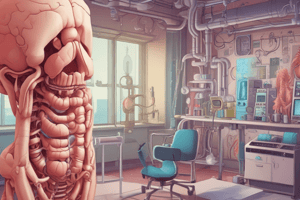Podcast
Questions and Answers
What are the major digestive hormones in the GI tract?
What are the major digestive hormones in the GI tract?
Major digestive hormones include gastrin, secretin, cholecystokinin, and gastric inhibitory peptide.
Describe the major excitatory and inhibitory motor neurotransmitters in the GI tract.
Describe the major excitatory and inhibitory motor neurotransmitters in the GI tract.
Major excitatory neurotransmitters include acetylcholine and substance P, while major inhibitory neurotransmitters include nitric oxide and vasoactive intestinal peptide.
Describe the mixing and propulsive movements of the intestine.
Describe the mixing and propulsive movements of the intestine.
Mixing movements are primarily caused by segmental contractions, while propulsive movements are due to peristalsis.
Describe the neural circuitry driving major GI reflexes.
Describe the neural circuitry driving major GI reflexes.
What factors influence gastric emptying?
What factors influence gastric emptying?
Describe the Defecation Reflex.
Describe the Defecation Reflex.
Which of the following layers of plexuses are connected by nerve fibers in the GI tract?
Which of the following layers of plexuses are connected by nerve fibers in the GI tract?
The GI system is governed solely by intrinsic neurons.
The GI system is governed solely by intrinsic neurons.
What do intrinsic neural mechanisms refer to in the GI system?
What do intrinsic neural mechanisms refer to in the GI system?
What is the role of extrinsic neural mechanisms in the GI tract?
What is the role of extrinsic neural mechanisms in the GI tract?
Flashcards are hidden until you start studying
Study Notes
Major Neurotransmitters and Hormones in the GI Tract
- Excitatory neurotransmitters facilitate GI motility and include substances like acetylcholine.
- Inhibitory neurotransmitters, such as serotonin and nitric oxide, regulate and reduce muscle contractions in the GI tract.
- Major digestive hormones like gastrin, secretin, and cholecystokinin impact various functions, including secretion and motility.
Neural Circuits Driving GI Reflexes
- GI reflexes are driven by complex neural circuitry, involving intrinsic and extrinsic mechanisms.
- The enteric nervous system contains the myenteric and submucosal plexuses, coordinating local reflexes.
- Extrinsic control incorporates external neurons, particularly the vagus nerve, enhancing digestive functions.
Swallowing Reflex and Esophageal-Gastric Junction
- The swallowing reflex is a coordinated action of muscles that facilitates food passage from the throat to the stomach.
- The esophageal-gastric junction is a critical area where swallowed food transitions into the stomach, regulated by coordinated muscle contractions.
Factors Influencing Gastric Emptying
- Various factors can affect gastric emptying, including the composition of food, volume ingested, and hormonal signals.
- Liquids generally empty faster than solid foods, and high-fat meals may delay gastric emptying.
Mixing and Propulsive Movements of the Intestine
- The intestine performs mixing movements, promoting the interaction of chyme with digestive enzymes.
- Propulsive movements, including peristalsis, move contents along the GI tract.
Defecation Reflex
- The defecation reflex is a complex process that facilitates the expulsion of waste from the body.
- Involves both voluntary and involuntary control to regulate bowel movements effectively.
Structural Organization of the GI Tract
- The GI tract comprises layers including mucosa, submucosa, muscularis externa, and serosa.
- The myenteric plexus (between muscle layers) and the Meissner plexus (below submucosa) are critical for GI motility and secretion.
Control of Digestive System Movements
- Movement in the digestive tract is influenced by neural mechanisms: intrinsic (myenteric and submucosal) and extrinsic (vagus nerve).
- Hormonal mechanisms enhance or inhibit smooth muscle contraction to regulate GI activity.
- Local mechanisms allow coordination of responses to changes in pH and chemical stimuli.
Studying That Suits You
Use AI to generate personalized quizzes and flashcards to suit your learning preferences.




